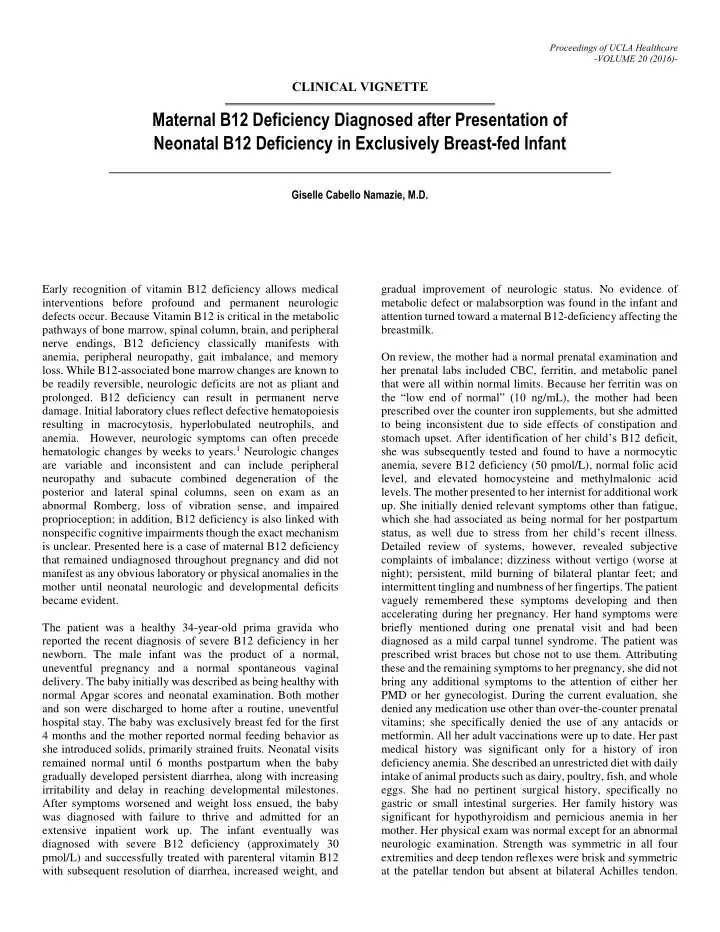

Proceedings of UCLA Healthcare -VOLUME 20 (2016)- CLINICAL VIGNETTE Maternal B12 Deficiency Diagnosed after Presentation of Neonatal B12 Deficiency in Exclusively Breast-fed Infant Giselle Cabello Namazie, M.D. Early recognition of vitamin B12 deficiency allows medical gradual improvement of neurologic status. No evidence of interventions before profound and permanent neurologic metabolic defect or malabsorption was found in the infant and defects occur. Because Vitamin B12 is critical in the metabolic attention turned toward a maternal B12-deficiency affecting the pathways of bone marrow, spinal column, brain, and peripheral breastmilk. nerve endings, B12 deficiency classically manifests with anemia, peripheral neuropathy, gait imbalance, and memory On review, the mother had a normal prenatal examination and loss. While B12-associated bone marrow changes are known to her prenatal labs included CBC, ferritin, and metabolic panel be readily reversible, neurologic deficits are not as pliant and that were all within normal limits. Because her ferritin was on the “low end of normal” (10 ng/mL), the mother had been prolonged. B12 deficiency can result in permanent nerve damage. Initial laboratory clues reflect defective hematopoiesis prescribed over the counter iron supplements, but she admitted resulting in macrocytosis, hyperlobulated neutrophils, and to being inconsistent due to side effects of constipation and stomach upset. After identification of her child’s B12 deficit, anemia. However, neurologic symptoms can often precede hematologic changes by weeks to years. 1 Neurologic changes she was subsequently tested and found to have a normocytic are variable and inconsistent and can include peripheral anemia, severe B12 deficiency (50 pmol/L), normal folic acid neuropathy and subacute combined degeneration of the level, and elevated homocysteine and methylmalonic acid posterior and lateral spinal columns, seen on exam as an levels. The mother presented to her internist for additional work abnormal Romberg, loss of vibration sense, and impaired up. She initially denied relevant symptoms other than fatigue, proprioception; in addition, B12 deficiency is also linked with which she had associated as being normal for her postpartum status, as well due to stress from her child’s recent illness. nonspecific cognitive impairments though the exact mechanism is unclear. Presented here is a case of maternal B12 deficiency Detailed review of systems, however, revealed subjective that remained undiagnosed throughout pregnancy and did not complaints of imbalance; dizziness without vertigo (worse at manifest as any obvious laboratory or physical anomalies in the night); persistent, mild burning of bilateral plantar feet; and mother until neonatal neurologic and developmental deficits intermittent tingling and numbness of her fingertips. The patient became evident. vaguely remembered these symptoms developing and then accelerating during her pregnancy. Her hand symptoms were The patient was a healthy 34-year-old prima gravida who briefly mentioned during one prenatal visit and had been reported the recent diagnosis of severe B12 deficiency in her diagnosed as a mild carpal tunnel syndrome. The patient was newborn. The male infant was the product of a normal, prescribed wrist braces but chose not to use them. Attributing uneventful pregnancy and a normal spontaneous vaginal these and the remaining symptoms to her pregnancy, she did not delivery. The baby initially was described as being healthy with bring any additional symptoms to the attention of either her normal Apgar scores and neonatal examination. Both mother PMD or her gynecologist. During the current evaluation, she and son were discharged to home after a routine, uneventful denied any medication use other than over-the-counter prenatal hospital stay. The baby was exclusively breast fed for the first vitamins; she specifically denied the use of any antacids or 4 months and the mother reported normal feeding behavior as metformin. All her adult vaccinations were up to date. Her past she introduced solids, primarily strained fruits. Neonatal visits medical history was significant only for a history of iron remained normal until 6 months postpartum when the baby deficiency anemia. She described an unrestricted diet with daily gradually developed persistent diarrhea, along with increasing intake of animal products such as dairy, poultry, fish, and whole irritability and delay in reaching developmental milestones. eggs. She had no pertinent surgical history, specifically no After symptoms worsened and weight loss ensued, the baby gastric or small intestinal surgeries. Her family history was was diagnosed with failure to thrive and admitted for an significant for hypothyroidism and pernicious anemia in her extensive inpatient work up. The infant eventually was mother. Her physical exam was normal except for an abnormal diagnosed with severe B12 deficiency (approximately 30 neurologic examination. Strength was symmetric in all four pmol/L) and successfully treated with parenteral vitamin B12 extremities and deep tendon reflexes were brisk and symmetric with subsequent resolution of diarrhea, increased weight, and at the patellar tendon but absent at bilateral Achilles tendon.
Recommend
More recommend